上海公示语翻译
公示语的翻译

公示语汉英翻译的原则
在公示语功能特色和语言风格的基础上, 刘法公(2008)以纽马克的文本分类作为理 论依据,试提出公示语汉英翻译三原则:统 一(consistency)、简洁(conciseness)和 易懂(comprehensibility)。这三个翻译标 准基本上能反映公示语独特的社会功能和语 言特征,能满足公示语汉英翻译标准问题的 特殊需要。
Out-Patient Department Stamp Vending Machine Take Away Service Available Baby Chang失物品 店方概不负责 Management nor responsible for articles lost or stolen;
高教园区:Higher Education Zone
杭州高新技术开发区 原译:High and New Technology Development Region “杭州高新技术开发区”的原译有两个问题:第一,把“高 新技术”对号入座地译成了“High and New Technology”是不 查辞典想当然的结果。第二,将“开发区”译为 “Development Region”,也不正确。美国的Webster’s New World Dictionary of the American Language (Second College Edition)给region和zone两个词的解释是:region,“an administrative division of a country (某一国家的行政区)”,如 “香港特别行政区”的英语就是“Hongkong Special Administrative Region”,简称Hongkong SAR;“澳门特别行 政区”的英语也是“Macao Special Administrative Region”, 简称Macao SAR;zone,“any area or region considered as separate or distinct from others because of its particular use…”。 显然,zone是指“有特殊用途并与其它区域分开或不同的区 域”,如:Cotton zone (种棉区),non-military zone (非军事 区) 等。所以,“开发区”应译为“Development Zone”。
公示语的汉英翻译
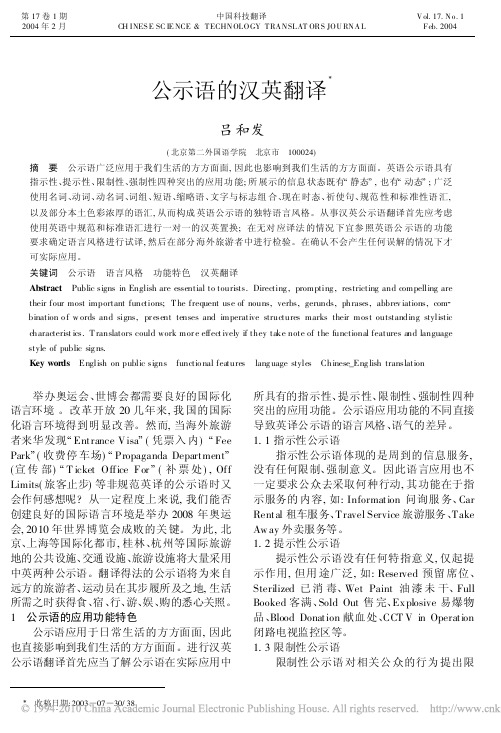
中国科技翻译 CH INES E SC IE NCE & TECHN OLO GY TRA N SLAT OR S JO U RN A L
V ol. 17. N o. 1 Feb. 2004
公示语的汉英翻译
吕和发
( 北京第二外国语学院 北京市 100024)
3. 2 动词、 动名词的使用 限制性、 强制性、 表示 动态 意义的公示语 大量使用动词、 动名词 , 将公众的注意力集中在 要求公众采取的行动上。如 Keep Silence 保持 安静、 Slow 减速行驶、 No Parking 严禁停车、 No Spitt ing 严禁随地吐痰、 No Dog Pooping 严禁狗 便等。 3. 3 词组、 短语的使用 动词短语、 名词短语大量应用于公示语, 其 结构简短 , 易于识别 , 如 Open Now 现在营业、 Check In 入住登记、 Drive_in Cinema 汽车影院、 Dut y Manager 值班经理、 Game Reserve 野生动 物保护区、 M et er P arking 记时收费停车场等。 3. 4 缩略语的应用 公众和旅游者最常接触和使用的公共设施 和服务的公示语会使用缩略语显示, 一目了然 , 如 IDD 国内直播、 DDD 国际直播、 i 旅游咨询、 P 停车场、 F& B 餐饮服务、 YHA 青 年旅舍、 sq 广场、 cnt r 中 心、 VIP Suite 贵宾 候机 室、 ENT Depart ment 耳鼻喉科等。 3. 5 严格禁用生僻词汇 英语公示语的词汇选择非常重视公众化 , 严格避免使用生僻词语、 古语、 俚语、 术语, 如 : No L it tering 请勿乱扔废弃物、 Occupied( 厕所 ) 有人、 Det our 绕 行、 Frag ile 小 心 易 碎、 Private Parking 专用车位、 Delayed( 航班 ) 延误等。 3. 6 现在时态的应用 公示语给予所处特定区域范围的公众以现 实行为的指示、 提示、 限制、 强制, 为此 , 时态应 用仅限于现在时, 如: Keep Dry 保持干燥、 Give Way T o Buses 公 交 优先、 Don ∀ t Drive When T ired 严 禁疲 劳驾 驶、 Protect Against H eat 怕 热、 Fasten Your Seat Belt 系好安全带等。 3. 7 祈使句的使用 由于外出或旅游的公众多是行色匆匆, 公 示语针对的目标公众又是明确的 , 所以公示语 便避免了程式化的客套 , 大量应用祈使句, 如 : Do Not Dist urb 请勿打扰、 Keep Off T he Grass 勿踏草坪、 Handle Wit h Care 小心轻放、Bew are Pedest rians 注意行人等。 3. 8 规范性和标准性语汇 由于公示语在公众和旅游者生活中的重要 性 , 任何歧意、 误解都会导致不良后果。与日常 生活相关的英语公示语都是多年实际使用形成 的规范和标准表达语汇 , 如 : T w o Way 双向行
公示语中英翻译
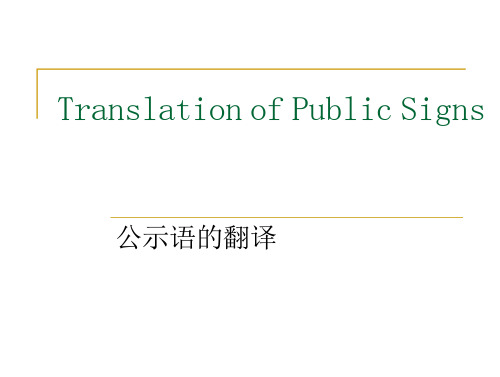
四、公示语的示意功能
■ 指示性Directing (static)
❏ 票务与旅游中心Ticket & Travel Centre ❏ 地 铁 Underground ❏ 行 人 Pedestrians ❏ 公共厕所Public Toilet ❏ 问询服务Information ❏ 婴儿换巾处Baby Change
钢铁厂
Steel and Iron Factory
Iron and Steel Factory
海尔整体 Haier Unit
厨房
Kitchen
Haier Kitchen Unit
e.g. 9 Misspelled English Words
e.g.10 Misunderstanding the Source or Target Language
❏ 共同努力,世界更精彩Working together, we can make a world of difference.
■ 防范犯罪
❏ 警示他人,迅速撤离Warn others. Move away. ❏ 盗贼当心Thieves Beware
六、公示语的种类
■ Shopping Signs
四、公示语的示意功能
■ 强制性Compelling (dynamic)
❏ 警戒线勿超越Police Line Do Not Cross ❏ 严禁拍照No Photography ❏ 禁止通行Don’t Walk ❏ 禁酒区Alcohol Free Zone ❏ 禁止导游讲解NO BRIEFING OF GROUPS
11. Omitting
■ 患心脏病、高血压、酗酒者忌座”. ■ Anyone who with heart disease, high blood, please
【英语翻译】公示语的翻译
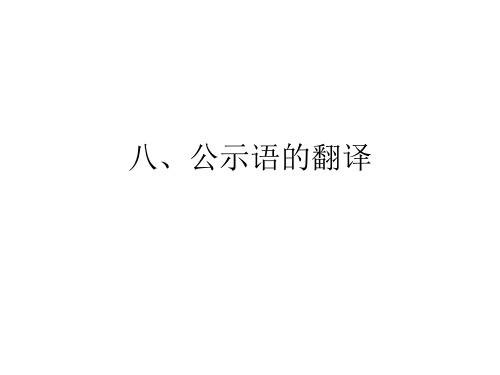
• NO THROUGH ROAD FOR MOTOR VEHECLES. • There is no way out at the other end of this road for cars. • CYCLISTS DISMOUNT HERE. • Cyclists should get off their bicycles here. • NO ADMISSION TO UNACCOMPANIED MINORS. • Young people under 18 years old can only come if they are with an adult.
• • • • • • • • • • •
3. 告示性的regulatory notices: NO SMOKING NO PARKING NO EXIT PLEASE DO NOT DISTURB PLEASE DO NOT FEED THE ANIMALS DO NOT LEAN OUT OF THE WINDOW KEEP OFF THE GRASS EXAMINATIONS IN PROGRESS ADMISSION TO TICKET HOLDERS ONLY SHOPLIFTERS WILL BE PROSECUTED
• 下面这些例句显示了公示语和日常口语的 对照: • FEEDING ANIMALS STRICTLY PROHIBITED. • You are not allowed to feed the animal. • PENALTY FOR DROPPING LITRE ---- UP TO £100 FINE. • You can be taken to court and made to pay £100 for dropping rubbish.
城市公示语英译

城市公示语英译1. 引言城市公示语是城市中常见的一种文字表达形式,通过悬挂在城市街头、广场、公园等地方的标语牌或广告牌上,向市民和游客传达相关信息。
这些公示语通常以简洁、生动的方式呈现,旨在吸引人们的注意,并有效地传达特定信息。
本文将探讨城市公示语的英译问题,包括常见翻译策略和技巧,并提供一些例子进行说明。
2. 常见翻译策略2.1 直译法直译法是最基本的翻译策略之一,即将源语言(中文)直接翻译成目标语言(英文),尽量保持原汁原味。
在城市公示语的英译中,这种方法可以较好地保留原始信息,但有时可能会产生不够自然流畅或难以理解的表达方式。
例如:•中文:欢迎光临我们美丽的城市!英文:Welcome to our beautiful city!2.2 意译法意译法是指根据源语言文本所要表达的意思,在目标语言中找到合适的表达方式。
这种方法在城市公示语的英译中常常被使用,因为它可以更好地传达信息,并且使翻译更加自然。
例如:•中文:绿色出行,共享未来!英文:Green travel, share the future!2.3 增译法增译法是指在翻译过程中,根据目标语言的表达习惯和需要,对源语言文本进行适当的增补或补充。
这种方法在城市公示语的英译中常常被使用,以便更好地传达信息。
例如:•中文:请保持环境整洁英文:Please keep the environment clean and tidy3. 翻译技巧3.1 注意上下文在进行城市公示语的英译时,要注意上下文信息。
有时候一个短语或句子可能在单独看时很难理解,但放在特定背景下就能明白其含义。
因此,在进行翻译时要充分考虑上下文,并尽量还原原始信息。
例如:•中文:爱护花草树木英文:Take good care of flowers, plants, and trees3.2 简洁明了城市公示语通常以简洁明了的方式表达信息,因此在翻译时要尽量遵循这一原则。
过于冗长的翻译可能会使信息不够清晰,甚至失去吸引力。
公示语的翻译1
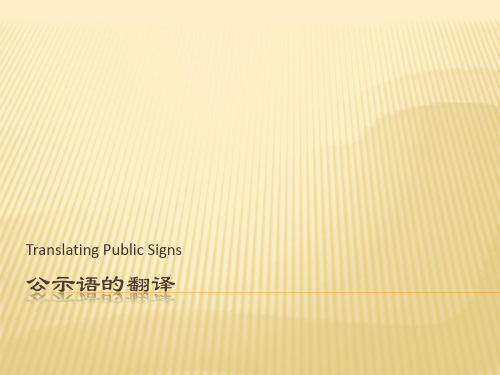
公示语的翻译
1. 了解公示语的含义及背景知识 2. 了解公示语的语言特点 3. 掌握公示语的翻译技巧 4. 掌握商务翻译中的词类转换技巧
WHAT ARE THE PUBLIC SIGNS
公示语是为公众提供各种告示、提示、指示、 显示、警示灯信息的图形、文字、标识的综合 体。 公示语又称标志语、标识语等 A board giving information, warning, etc.
LANGUAGE CHARACTERS
The use of nouns: Caution: pedestrians Short & concise: Passengers only (送客止步) Footpath closed(边道封闭)
Examples
Shopping Signs
Iron and Steel Factory Haier Kitchen Unit
海尔整体 厨房
e.g. 9
Misspelled English Words
Omitting
患心脏病、高血压、酗酒者忌座”. Anyone who with heart disease, high blood, please don’t get on. No recommendation for people suffering from heart diseases, high blood pressure or the effects of over drinking. 肇庆市公安局报警中心 Zhaoqing City Center of Reporting to the Police Police Report Center (of Zhaoqing City)
公示语翻译

Translation Strategies
❖ Borrow:借用英语中对应的表达方法; ❖ Adapt:参照英语中类似的表达方式进行
适当的更改; ❖ Create:在前两种情况都不存在的情况下,
❖ We are authorized to demand proof of buyer’s age. 本店有权要求购烟者提供年龄证明。
Comparison with Daily Expressions
❖ FEEDING ANIMALS STRICTLY PROHIBITED. ❖ You are not allowed to feed the animal. ❖ PENALTY FOR DROPPING LITRE ---- UP TO £100
❖ Little grass is smiling slightly. Please walk on the pavement.
❖ 护一片绿叶,献一份爱心。
❖ Protect a piece of green leaf and dedicate a share of love.
❖ Take care of the grass to keep the place green.
❖ PLEASE QUEUE OTHER SIDE (请在那边排队)
❖ THESE SEATS ARE APPRECIATED BY THE OLD AND INFIRM (年老体弱者座位)
Regulatory Notices
❖ PLEASE DO NOT FEED THE ANIMALS 请勿在此喂养动物!
也谈“公示语”和“publicsigns”

教育研究现今社会中,无论是学生、家长、企业、国家等都对于高等职业院校的毕业生的考核评价有着不同的理解。
学生希望以接受高等职业教育后走向社会后,可以以自己的水平能力立足社会;家长希望学生接受高等职业教育走向社会后,学生快速进步发展,功成名就;企业希望通过使高职毕业生在校期间强化考核评价,可以提高学生的综合素质水平,提升毕业生质量;国家希望通过学生的考核评价可以提高社会整体的高素质应用型人才的水平,促进地方区域经济快速发展。
由此可见,高等职业教育学生考核评价是其毕业生质量提高的风向标,是高等职业教育改革的方向指针。
只有全面考虑各方利益,调动各方的积极性,学生的考核评价才能促进高等职业教育健康稳定发展。
参考文献:[1]唐杰,吉俊民.全面实施素质评优引导学生进行素质教育[J].清华大学学报,2001(1):6-10.[2]周立志.高职高专教育教学评价体系的比较研究[J].高教探索,2002(10):17-20.[3]吴钢.现代教育评价课程[M].北京:北京大学出版社,2008.31.[4]李瑞昌.高等职业教育考试改革的探索与实践[J].潍坊高等职业教育,2008(12):8-11.[5]左宏明.高等职业教育考试考核改革与探索[J].辽宁高职学报,2007(11):4-5.1.引言2002年,“公示语”一词由北竹和单爱民在《谈英语公示用语的语言特点与汉英翻译》中首次提出。
随后,中国学者从多个方面对“公示语”展开了研究。
截至2018年6月,中国期刊网(CNKI)上篇名中含有“公示语”的文章已达2100多篇。
由此可见,“公示语”已经吸引了不少中国学者,成为研究热点。
对于该词对应的英文,学者们持不同意见。
如:刘丽芬认为应译为“public signs”(2016),而赵楠和黄忠廉则认为译成signs 更可行(2015)。
造成译文不统一的主要原因可能是学者们对基本概念界定不清。
下面将对“公示语”和“(public)signs”的概念进行梳理。
12公示语翻译
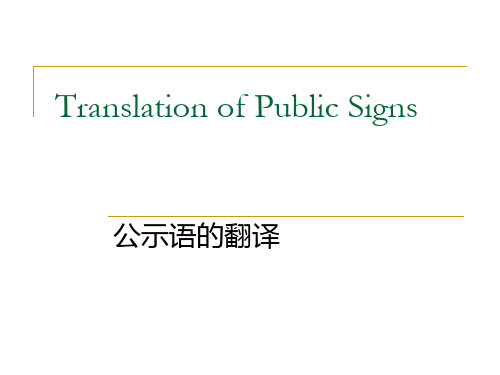
巩固形象
五、公示语的特定功能
服务社会
为改善北京的空气质量,本车安装有环保引擎 This bus is fitted with an environmentally cleaner engine helping to improve Beijing’s air quality. 共同努力,世界更精彩 Working together, we can make a world of difference. 警示他人,迅速撤离 Warn others. Move away. 盗贼当心 Thieves. Beware.
Translation of Public Signs
公示语的翻译
一、定义
公示语:公开和面对公众,告示、指示、提示、显示、警示、标 示与其生活、生产、生命、生态、生业休戚相关的文字及图形信 息。 --《汉英公示语词典》,商务印书馆,2002 A board or other notice giving information, warning, direction, and etc. --Longman Dictionary of Contemporary English (1978) A board, notice, and etc. that directs somebody towards something, gives a warning, advertises a business. --Oxford Advanced Learner’s English-Chinese Dictionary (1997) A notice that is publicly displayed giving information or instruction in a written or symbolic form.-- New Oxford Dictionary of English (2001). A board, poster, or placard displayed in a public place to advertise or to convey information or a direction. --The American Heritage Dictionary of the English Language(2003)
翻译课-公示语的翻译
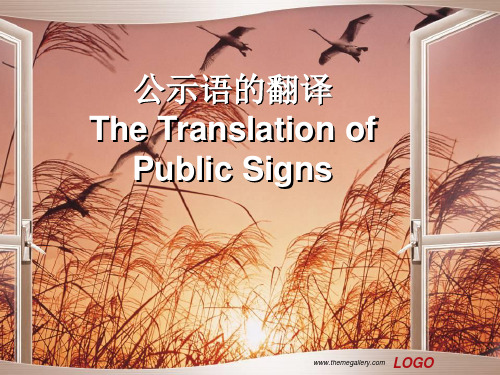
3、限制性公示语:对相关交际对象的行为 进行限制、约束,对交际对象的行为按照其 意图进行规范,但其指令性语气较弱,语言 应用直截了当。
No Bargain 谢绝还价 Stand in Line 站队等候 Staff Only 顾客止步 Ticket Only 凭票入场 Pay in Cash 现金支付 Handicapped Only 残疾人通道 60km/h (限速)60公里 No Exchange 谢绝更换
2、提示性公示语:对其交际对象起到提示 或告知作用,使交际对象根据提示的内容作 出相应的安排,用途较广泛,比如“车位以 满”、“小心碰头”等。
Reserved 预留席位 Sold Out 售完 Wet Paint 油漆未干 Wait Here 请在黄线后等候 Full Booked 客满 10% Service Charge 加收10%服务费 Automatic Tap 伸手出水 Not Drinkable 非饮用水 Sterilized 已消毒
英汉公示语虽然有许多相似之处,但受到 各自语言表达习惯、思维方式以及不同文化 传统的 影响,他们之间又存在许多不同之 处。主要表现在五个方面:
1、对名词中心词的不同形式的修饰 2、不同的表达角度 3、对称结构和不对称结构 4、“禁止/请勿 + 动词”结构与“No + 名词”结 构 5、主动形式与被动形式
2、简洁性原则 例如: 保持安静 Quiet Please! 仅限在紧急情况下使用 Emergency Use Only 商品展示柜,此商品不参加活动 Display Only
3、语境优先原则 例如: 车载监视器在工作 (公交车上) Cameras in Operation 当心路滑 (商场)Caution! Slippery! (公路)Caution! Slippery When Wet.
生态翻译学视角下的公示语翻译——以上海世博会主题标语为例

他 四肢发 达 , 头脑 简单 。
He h s mo e b a h n b a n. a r r wn t a r i
参考 文献 :
方 梦 之 . 学词 典 [ ] 上 海 : 海 外语 教 育 出 版 社 ,0 4 译 Z. 上 20.
面 临 经 济 危 机 的 时候 , 育 产 业 反 而 兴 旺 。 教
Ec n mi e e so o m s b te u ain b o . o o c r c s in l o , u d c to o ms
本 文材 料来 源 : 主要来 自 Ci aySaga D i 、e h aD i 、hnhi ayNw n l l
Y r i s和 Re dr okTme a e ’Diet等报 刊和 杂 志 。 gs
将 词 汇 的原 始 意 义 引 申运用 , 内涵 上 可 激发 在
读 者 丰 富 的 联 想 , 利 用 词 汇 的 搭 配 所 产 生 的 韵 味 但
我们 应 该 以乐观 的 态度 对待 生活 的压力 。
W e s o l a e p e s r t la u e h u d f c r s u e wih p e s r .
生态 翻译 学 ( c -a s t oy 的概 念是 近 年 由 E ot n l o g ) r al
Lf” i 都让 人们 一 目了然 。这 是 成 功公 示 语 的典 范 , e 充分 体现 了公示 语 简 洁 易懂 的文 字 表述 , 合 用 物 符 理媒介 在公 共场 所传 递特定 信 息 的特 点 。然 而 当我
们将 上海 世博会 主 题 标语 的 中英 文 进 行对 照 时 , 会
[ 稿 日期 ]2 1 -1 2 收 00- - 0 2
公示语翻译.
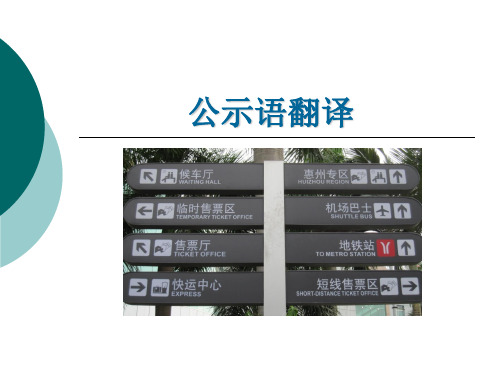
2. 提示性公示语(Informatory Public Signs)
提示性公示语为公众提供有关告知性信息, 比如:油漆未干(Wet Paint)、此货暂缺 (Out of Stock)、正在维修(Under Repair)、保留车位(Reserved)等。
3. 警示性公示语(Cautionary Public Signs) 警示性公示语起警示作用,提醒公众需要注意的问 题,如:小心轻放(Handle With Care)、小心地 滑(Caution! Wet Floor!)、前方有学校 (School Ahead)、当心滚石(Falling Rocks)等。 4. 限制性公示语(Restrictive Public Signs) 限制性公示语限制、约束公众的有关行为,特别强 调公众应当注意的事项,起告知和提醒的双重作用, 比如:残疾人设施(Disabled Only)、限高3米 (Restricted Height 3M)、限速60—80公里 (Speed Limit 80 Minimum 60 kilometers)等。
WARNING Mind your head 注意:当心碰头
No mobile phones 禁用手机 Fire alarm 火险报警
ห้องสมุดไป่ตู้
Explosive 易爆物 Pedestrian crossing 行人过街道
Task III 下列双语图片中的译文有待 改进,请修改并说明理由。
PLEASE KEEP OFF THE GRASS
根据公示语的语言风格和语气特征,公 示语可以分为:
1. 指示性公示语(Directive Public Signs) 指示性公示语体现了公共场所对公众的信息服 务水平,对公众没有限制、警示和强制意义,主要 起到为公众指示方位、地点、服务等作用,比如: 急救(First Aid)、旅游服务(Travel Service)、 售票处(Ticket Office)等。
生态翻译学视角下的公示语翻译_以上海世博会主题标语为例

[收稿日期]2010-01-22[作者简介]束慧娟,苏州大学外国语学院讲师,学术方向:翻译理论与实践,系统功能语言学檿檿檿檿檿檿檿檿檿檿檿檿檿檿檿檿檿檿檿檿檿檿檿檿檿檿檿檿檿檿檿檿檿檿檿檿檿檿檿檿檿檿檿檿檿檿。
5.利用词的韵味增强表达的生动性将词汇的原始意义引申运用,在内涵上可激发读者丰富的联想,但利用词汇的搭配所产生的韵味和节奏也同样具有十分生动的效果。
英语中具有很多这类固定搭配的词汇,如forgive and forget ,tit-for-tat ,helter-skelter ,brain-drain 等,在英语运用中,通过恰当的选词而创造出的韵味能达到生动的效果,如:这个时代有些人贫困潦倒,而有些人腰缠万贯。
This is an age of both poverty and plenty.他四肢发达,头脑简单。
He has more brawn than brain.面临经济危机的时候,教育产业反而兴旺。
Economic recession looms ,but education booms.他一夜间从默默无闻成为英雄人物。
He rose from zero to hero overnight.我们应该以乐观的态度对待生活的压力。
We should face pressure with pleasure.经济萧条的时候,失业的人多,而找到工作的人少。
In the economic slump there is more firing than hiring.房地产业兴起了一阵子,随之马上出现了萧条。
The housing market boomed and then busted.参考文献:方梦之.译学词典[Z ].上海:上海外语教育出版社,2004.本文材料来源:主要来自China Daily 、Shanghai Daily 、New York Times 和Reader ’Digest 等报刊和杂志。
公示语翻译(沪江)

• 7. 过度翻译(累赘、啰嗦): • 所有商品不讲价 • All fixed prices. No Bargain • 建议译文:No Bargaining • 导盲犬不限(厕所) • Guide dogs are not in this limitation • 建议译文:Guide Dogs Allowed
• 售票时间已过,停止入馆 • Stop Receiving Visitors (命令句,显得粗 暴无礼) • 建议译文:Closed
• • • •
变换车道,注意后车 Change Lane, Notice Behind 1) 仅考虑中文原文顺序是不够的; 2) 还要注意两个动作之间实际的逻辑关 系; • 3) 并且在译文中表现出来
• 减肥茶 Reduced Body Weight Tea • 建议译文:Slimming Tea • 现爆玉米花 Now Bomb Popcorn • 建议译文: Fresh Popcorn
公示语英译技巧总结
• 1. 翻译转换 语境关联 • 根据具体语境,确定词义,灵活翻译 • 拳头产品 • Fist Product (字面意思,不知所云) • 建议译文: Knockout Product
沪宁高速公路上的路牌?
保持车距?
• Keep a safe distance
• 5. 胡译:
• 请随手关灯 Please Close Lamp • 建议译文:Turn Off Lights when Not in Use.
• 宾客止步 Guest Go No Further • 建议译文:Staff Only
Jokes about Misinterpreted Translations 吳劍修
Misinterpreted Translations Academic writing
第十一讲 公示语的翻译

B. 使用Attention或Notice等具有公告意义的词 1. ATTENTION NO PETS ALLOWED. (注意:请勿携带宠物入内) 2. Attention: Lockers are Not in Service at This Time at the Request of the Federal Aviation Administration. (通告:应联邦航空管理局要求,储物柜此 刻暂停使用。)
第 九 讲
公示语的翻译
Translation of Signs
一、什么是公示语? 公开和面对公众,告示、指示、 提示、显示、警示、标示与公众生活、 生产、生命、生业等休戚相关的文字及 图形信息。
(王颖 吕和发: 《公示语汉英翻译》)
二、公示语的特点与作用 (一)特点 1、 可认知性 2、 普遍性 3、 公益性 4、 约束性
禁止(严禁、请勿)入内;谢绝参观 No Entry / No Admittance 禁止通行(通过) Access Prohibited / No Passing 免费物品(宾馆客房内免费食品、饮料等) Complimentary 钱款当面点清,离柜概不负责 Please Count your Change Before Leaving 请出示证件 Please Show Your ID
D. 使用一般将来时的被动结构 1. All Unauthorized Vehicles Will Be Towed by Rokaitis Industries Inc. (所有违章停靠车辆将被罗凯提斯工业公 司拖走) 2. This is a Non-Smoking Room. If smoking occurs during your stay a $150 Cleaning Fee will be billed to your account. (此为无烟房。若阁下入住期间抽烟, 您的账单上将会增加150美元的清洁费。)
unit 13 公示语的翻译

Out—patient Department In—patient Building Taxi Stand Snack Bar Locker 门诊 住院大楼 出租车侯客处 快餐冷饮 存包处
突出提示、限制。强制功能的公示语广泛应 用于公共交通、公共设施、紧急救援等方 面,更多地使用展现“动态” 意义的语汇表 达,
Anniversary Sale
China Long Standing Shop More Sales at a Low Profit Enjoy a Good Market at Home and Abroad
Fake Commodity Free Store
八折优惠 今日特价
20% Off
当日可取
英语公示语语汇简洁,措辞精确,只要不影 响公示语准确体现特定的功能、意义,仅使 用实词、关键词、核心词汇,而冠词、代词、 助动词等就都可以省略.
PASSENGERS ONLY 送客止步、 DANGER 危险、 IOCKER ROOM 更衣室、 WASHING BAY 洗车场、 OPEN NOW 现在营业、 ADMISSION FREE 免票入场 BEVERAGE NOT INCLUDED 酒水另付。
NO LITTERING 请勿乱扔废弃物、 OCCUPIED (厕所)有人、 DETOUR 绕行、 FRAGILE 小心易碎、 PRIVATE PARKING 专用车位、 DELAYED (航班)延误、 BAGGAGE CLAIM AREA 行李提取处、 LOST&FOUND 失物招领、 HIGHWAY PETROL 公路巡警、 CHILDREN’S CROSSING 儿童过街道、 TAXI PICK—UP POINT 出租乘车站点
2)指示性功能 TAKE AWAY 外卖服务 OUT—PATIENT DEPARTMENT 门诊部 NIGHT CLUB 夜总会 GENERAL HOSPFFAL 综合医院 INFORMATION 问询服务 CAR RENTAL 租车服务 TRAVEL SERVICE 旅游服务、
unit10公示语的翻译

PHARMACY CHEMIST’S SHOP POSTPAID POSTFREE WATCH YOUR STEP MIND YOUR STEP
药房(美) 药房(英) 邮资已付(美) 邮资已付(英、澳) 脚下留神(美) 脚下留神(英)
公示语汉英翻译的原则
在公示语功能特色和语言风格的基础上, 刘法公(2008)以纽马克的文本分类作为理 论依据,试提出公示语汉英翻译三原则:统 一(consistency)、简洁(conciseness) 和易懂(comprehensibility)。这三个翻 译标准基本上能反映公示语独特的社会功能 和语言特征,能满足公示语汉英翻译标准问 题的特殊需要。
GLASS 小心玻璃
PLEASE MIND THE STEP 请小心台阶
Please DO NOT put other types of plastics in the bin 请勿将其他种类的塑料投入此垃圾桶
No Cigarette Disposal 不准乱扔烟头
公示语的语言特点
put to towels you want washed on the floor. leave towels you will use again on the towel racks. This simple gesture helps to protect the environment. Thank you. Bomb Detectors: Your awareness can save lives. If you see any suspicious package or bag, do not touch. Warn others. Move away quickly.
名词(或动名词)+过去分词 Inspection Declined Road Closed Toilet Engaged Parking Permitted Smoking S词)+副词 Hands Off Safety First Staff Only Stairs Up Working Overhead
- 1、下载文档前请自行甄别文档内容的完整性,平台不提供额外的编辑、内容补充、找答案等附加服务。
- 2、"仅部分预览"的文档,不可在线预览部分如存在完整性等问题,可反馈申请退款(可完整预览的文档不适用该条件!)。
- 3、如文档侵犯您的权益,请联系客服反馈,我们会尽快为您处理(人工客服工作时间:9:00-18:30)。
Shanghai has been trying to harness English translations that sometimes wander, lik e “cash recyling machine.”By ANDREW JACOBSPublished: May 2, 2010SHANGHAI —For English speakers with subpar Chinese skills, daily life in China off ers a confounding array of choices. At banks, there are machines for “cash withdra wing” and “cash recycling.” The menus of local restaurants might present such dele ctables as “fried enema,” “monolithic tree mushroom stem squid” and a mysterious thirst-quencher known as “The Jew’s Ear Juice.”Those who have had a bit too much monolithic tree mushroom stem squid could fi nd themselves requiring roomier attire: extra-large sizes sometimes come in “fatso” or “lard bucket” categories. These and other fashions can be had at the clothing ch ain known as Scat.Go ahead and snicker, although by last Saturday’s opening of the Expo 2010in Sha nghai, drawing more than 70 million visitors over its six-month run, these and other uniquely Chinese maladaptations of the English language were supposed to have b een largely excised.Well, that at least is what the Shanghai Commission for the Management of Langua ge Use has been trying to accomplish during the past two years.Fortified by an army of 600 volunteers and a politburo of adroit English speakers, t he commission has fixed more than 10,000 public signs (farewell “Teliot” and “urine district”), rewritten English-language historical placards and helped hundreds of rest aurants recast offerings.The campaign is partly modeled on Beijing’s herculean effort to clean up English sig nage for the 2008 Summer Olympics, which led to the replacement of 400,000 stre et signs, 1,300 restaurant menus and such exemplars of impropriety as the Dongda Anus Hospital —now known as the Dongda Proctology Hospital. Gone, too, is Raci st Park, a cultural attraction that has since been rechristened Minorities Park.“The purpose of signage is to be useful, not to be amusing,” said Zhao Huimin, the former Chinese ambassador to the United States who, as director general of the c apital’s Foreign Affairs Office, has been leading the fight for linguistic standardization and sobriety.But while the war on mangled English may be considered a signature achievement of government officials, aficionados of what is known as Chinglish are wringing their hands in despair.Oliver Lutz Radtke, a former German radio reporter who may well be the world’s fo remost authority on Chinglish, said he believed that China should embrace the fanci ful melding of English and Chinese as the hallmark of a dynamic, living language. A s he sees it, Chinglish is an endangered species that deserves preservation.“If you standardize all these signs, you not only take away the little giggle you get while s trolling in the park but you lose a window into the Chinese mind,” said Mr. Radtke, who is the author of a pair of picture books that feature giggle-worthy Chi nglish signs in their natural habitat.Lest anyone think it is all about laughs, Mr. Radtke is currently pursuing a doctoral degree in Chinglish at the University of Heidelberg.Still, the enemies of Chinglish say the laughter it elicits is humiliating. Wang Xiaomi ng, an English scholar at the Chinese Academy of Social Sciences, painfully recalls t he guffaws that erupted among her foreign-born colleagues as they flipped through a photographic collection of poorly written signs. “They didn’t mean to insult me bu t I couldn’t help but feel uncomfortable,” said Ms. Wang, who has since become on e of Beijing’s leading Chinglish slayers.Those who study the roots of Chinglish say many examples can be traced to lazine ss and a flawed but wildly popular translation software. Victor H. Mair, a professor of Chinese at the University of Pennsylvania, said the computerized dictionary, Jings han Ciba, had led to sexually oriented vulgarities identifying dried produce in Chines e supermarkets and the regrettable “fried enema” menu selection that should have b een rendered as “fried sausage.”Although improved translation software and a growing zeal for grammatically unassai lable English has slowed the output of new Chinglishisms, Mr. Mair said he still rece ived about five new examples a day from people who knew he was good at deciph ering what went wrong. “If someone would pay me to do it, I’d spend my life stud ying these things,” he said.Among those getting paid to wrestle with Chinglish is Jeffrey Yao, an English transl ator and teacher at the Graduate Institute of Interpretation and Translation in Shan ghai who is leading the sign exorcism. But even as he eradicates the most egregiou s examples by government fiat —businesses dare not ignore the commissi on’s sugg ested fixes —he has mixed feelings, noting that although some Chinglish phrases s ound awkward to Western ears, they can be refreshingly lyrical. “Some of it tends t o be expressive, even elegant,” he said, shuffling through an online catalog of si gns that were submitted by the volunteers who prowled Shanghai with digital cameras.“They provide a window into how we Chinese think about language.”A Sampling of ChinglishHe offered the following example: While park signs in the West exhort people to “K eep Off the Grass,” Chinese versions tend to anthropomorphize nature as a way to gently engage the stomping masses. Hence, such admo nishments as “The Little Gra ss Is Sleeping. Please Don’t Disturb It” or “Don’t Hurt Me. I Am Afraid of Pain.”Mr. Yao read off the Chinese equivalents as if savoring a Shakespearean sonnet. “H ow lovely,” he said with a sigh.He pointed out that this lingui stic mentality helped create such expressions as “long time no see,” a word-for-word translation of a Chinese expression that became a mainstay of spoken English. But Mr. Yao, who spent nearly two decades working as a translator in Canada, has his limits. He showed a sign from a park designed to provide visitors with the rules for entry, which include prohibitions on washing, “sca venging,” clothes drying and public defecation, all of it rendered in unintelligible —and in the case of the last item —rather salty English. The sign ended with this h umdinger: “Because if the tourist does not obey the staff to manage or contrary ho lds, Does, all consequences are proud.”Even though he had had the sign corrected recently, Mr. Yao could not help but sh ake his head in disgust at the memory. And he was irritated to find that a raft of t roublesome sign verbiage had slipped past the commission as the expo approached, including a cafeteria sign that read, “The tableware reclaims a place.” (Translation: drop off dirty dishes here.)“Some Chinglish expressions are nice, but we are not translating literature here,” he said. “I want to see people nodding that they understand the message on these si gns. I don’t want to see them laughing.”。
